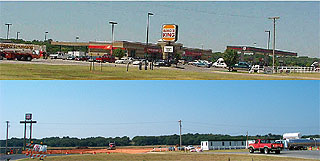An Oklahoma tribe is planning to build the largest casino in the state on land that wasn't taken into trust under the Indian Gaming Regulatory Act, according to a review of documents and interviews with federal officials.
The Chickasaw Nation acquired 10 acres in Goldsby on August 12, 1995, according to the deed. The tribe subsequently opened a travel plaza on the site, which is located along a major interstate about 20 miles south of Oklahoma City.
The tribe has since demolished the travel plaza to make way for a 190,000-square-foot casino. Multimedia Games, a gaming manufacturer in Texas, announced last week that it was kicking in $30 million for the $60 million project.
"By request of our tribal partner, we can give out no specific details," Clifton Lind, the chief executive officer of Multimedia, told investors and analysts on July 28, 2005
Normally, tribes that want to engage in gaming on land acquired after 1988, the passage of IGRA, face a rigorous review process. The Bureau of Indian Affairs and the National Indian Gaming
Commission determine if the tribe must go through a two-part determination process that requires
the approval of the state and consultation of local communities and neighboring tribes. Alternatively, the tribe could qualify for an exception under the law.
Both avenues can take years to complete. But the Chickasaw Nation is able to bypass the process by acquiring land for non-gaming purposes. Only later does the tribe decide to open up a casino.
The Chickasaws have engaged in this practice at least 17 times since 1988, allowing the tribe to open the largest number of gaming facilities in the state. The strategy has paid off well: the
tribe's casinos generated $4.3 billion in gross revenues during the last fiscal year.
But amid the rapid expansion of the $19.5 billion Indian gaming industry, the practice has raised the eyebrows of federal officials. In a forthcoming report, the Interior Department's Inspector
General criticizes the BIA and the NIGC for allowing the situation to continue unchecked.
In response to the report, the NIGC is developing a system to review all 404 casinos in the nation.
Penny Coleman, the agency's acting general counsel, acknowledged problems with the Indian lands determinations process.
"We're making these decisions as we determine that they are important or when we find out that there might be a big problem," Coleman told the Senate Indian Affairs Committee on July 27. "And that's not necessarily great government."
Despite recognition of the problem, neither the BIA nor the NIGC are aware of the Chickasaw Nation's plans for the 10 acres in Goldsby. The tribe hasn't asked for an Indian lands determination,
the agencies confirmed this week.
"The Chickasaw Nation currently has no land determinations pending," Shawn Pensoneau, the NIGC's spokesperson, told Indianz.Com. The agency is currently handling about 50 determinations, Coleman said in her Senate testimony.
The BIA is in the process of determining whether the Chickasaws qualify for an exception under Section 20 of IGRA, which includes language affecting Oklahoma tribes. But it's for an entirely different site, said George Skibine, the BIA's acting deputy assistant secretary for policy and economic development
"The Chickasaw Nation has only submitted one parcel for a Section 20 exemption, a facility in Ada," Skibine said in an interview. That decision has been pending for more than three years, indicating the length of the process.
Gaming acquisitions require approval by the BIA's central office in Washington, D.C. That never happened in the Goldbsy case because the tribe didn't state that it might use the land for gaming. The BIA agreed to take the land into trust on August 28, 1995, according to the deed.
Bypassing the process not only excludes the BIA and the NIGC, it also affects other tribes. The $60 million Goldsby facility would impact nearby casinos owned by the Cheyenne and Arapaho Tribes, the Absentee Shawnee Tribe and the Citizen Potawatomi Nation. Normally, these tribes would be consulted about the acquisition of trust land for gaming purposes.
Despite the apparent loophole, the BIA can't do anything to stop the practice, Skibine said in Senate testimony. At a May 18 hearing, he said the federal government can't impose title or deed
restrictions on the land once it has been taken into trust.
"If a tribe commits not to acquire land for purposes of Indian gaming, it is free, after acquiring that land, to change its mind. Is that correct?" said Sen. John McCain (R-Arizona), the chairman of the committee, who wanted to know how often the practice has occurred.
In his written testimony, Skibine said the "this practice is discouraged." But in his oral statement, he said that a tribe who makes this change should be required to comply with IGRA, either by seeking
an exception or going through the two-part determination route.
Two bills introduced in Congress would effectively put a halt to the practice by requiring tribes to state up front whether they intend to use lands for gaming. A third bill, supported by McCain, would force a California tribe to go through the two-part determination process before engaging in gaming on land already in trust.
Relevant Links:
Chickasaw Nation -
http://www.chickasawnation-nsn.gov
Multimedia Games -
http://www.multimediagames.com
NIGC Indian Land Determinations -
http://www.nigc.gov/nigc/nigcControl?option=LAND_DETERMINATIONS

